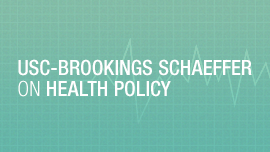2014 was indeed an important year for health and health care in the United States. It marked the fourth year of the Affordable Care Act and the first year of open enrollment for the Obamacare exchanges. It also included a historic slowdown in health spending– the lowest on record– and triggered key state decisions regarding whether or not to expand Medicaid programs. As evidence and evaluations emerged from several ACA initiatives, including Accountable Care Organizations and other large-scale demonstration projects, the law continued to face challenges in the courts and in Congress.
Below is a selection of Brookings Economic Studies scholars’ “Most Read” health care content across this diverse range of topics. To view a complete collection of Brookings health research and commentary, click here.
1. People Who Wanted Market-Driven Health Care Now Have it in the ACA
Alice M. Rivlin, Washington Post
As Obamacare enters its second open enrollment period, Alice M. Rivlin argues that market forces are indeed at work, and should be left alone to ensure that exchanges work effectively and meet the needs of millions of Americans.
2. Improving Health While Reducing Cost Growth, What is Possible?
Mark McClellan and Alice M. Rivlin, Brookings Health Policy Issue Brief
Developed as part of an April 2014 Future of U.S. Health Care Spending conference, this brief addresses two key questions: what policies could reduce the projects growth of health spending while enhancing population health? And how much difference might these policies make if successfully executed?
3. Election 2014: Biggest Changes to Health Care Will Happen Outside of Congress
Stuart Butler, Brookings UpFront
In this post-midterm election blog post, Stuart Butler content that in the states, not Congress, is where the ACA will face its greatest challenges in coming years.
4. Health Spending 25 Years Out
Louise Sheiner, Brookings UpFront
In response to the Congressional Budget Office’s July report on the long-term budget outlook, Louise Sheiner discusses how projections were sharply lower than those CBO made just five years ago, despite coverage expansions included in the ACA.
5. Stop the Anti-Obamacare Shenanigans
Henry Aaron, David M. Cutler and Peter R. Orszag, New York Times
In this NYT editorial, Henry Aaron and co-authors discuss the implications of Obamacare opposition efforts, including recent legal actions and interpretations of ACA statutes.
6. Is Obamacare Working? Yes.
Kavita Patel, U.S. News and World Report
Kavita Patel discusses Obamacare’s impact on three main goals: improving access to care, enhancing quality of care and controlling health spending.
7. 5 Questions about the Medical Device Tax, and its Potential for Repeal
Gregory W. Daniel, RealClear Markets
Republican control of Congress may bring a repeal of the medical device tax; Gregory Daniel provides a basic primer about the tax, and discusses potential scenarios for how it may fare in the 114th Congress.
8. Accountable Care Around the World: A Framework to Guide Reform Strategies
Mark McClellan, Health Affairs
Featured in the Health Affairs September global health issue, this article discusses the spread of “accountable care” strategies in health systems outside the United States.
9. Adopting Accountable Care: An Implementation Guide for Physician Practices
Mark McClellan, Farzad Mostashari, James Colbert, S. Lawrence Kocot, Brookings
Developed by the Brookings ACO Learning Network, this toolkit focuses on addressing four unique challenges for physician-led ACOs, including managing high-risk patients, developing referral networks, using health IT tools and engaging patients.
10. The Medicaid Boom and State Budgets: How Federal Waivers are Advancing State Flexibility
Keith Fontenot, Health Affairs Blog
Keith Fontenot discusses how federal waivers can provide states with more flexibility in expanding their Medicaid programs while reaching a political compromise, and provides a detailed look at the Arkansas private option model. [Read more in Fontenot’s post-midterm election post].
The Brookings Institution is committed to quality, independence, and impact.
We are supported by a diverse array of funders. In line with our values and policies, each Brookings publication represents the sole views of its author(s).




Commentary
Our most read health care stories of 2014
January 5, 2015